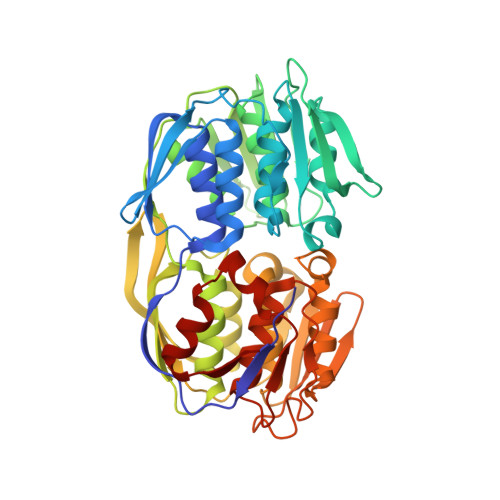Differential inhibition of class I and class II 5-enolpyruvylshikimate-3-phosphate synthases by tetrahedral reaction intermediate analogues.
Funke, T., Healy-Fried, M.L., Han, H., Alberg, D.G., Bartlett, P.A., Schonbrunn, E.(2007) Biochemistry 46: 13344-13351
- PubMed: 17958399
- DOI: https://doi.org/10.1021/bi701095u
- Primary Citation of Related Structures:
2PQ9, 2PQB, 2PQC, 2PQD - PubMed Abstract:
The shikimate pathway enzyme 5-enolpyruvylshikimate-3-phosphate synthase (EPSP synthase or EPSPS) is best known as the target of the herbicide glyphosate. EPSPS is also considered an attractive target for the development of novel antibiotics since the pathogenicity of many microorganisms depends on the functionality of the shikimate pathway. Here, we have investigated the inhibitory potency of stable fluorinated or phosphonate-based analogues of the tetrahedral reaction intermediate (TI) in a parallel study utilizing class I (glyphosate-sensitive) and class II (glyphosate-tolerant) EPSPS. The (R)-difluoromethyl and (R)-phosphonate analogues of the TI are the most potent inhibitors of EPSPS described to date. However, we found that class II EPSPS are up to 400 times less sensitive to inhibition by these TI analogues. X-ray crystallographic data revealed that the conformational changes of active site residues observed upon inhibitor binding to the representative class I EPSPS from Escherichia coli do not occur in the prototypical class II enzyme from Agrobacterium sp. strain CP4. It appears that because the active sites of class II EPSPS do not possess the flexibility to accommodate these TI analogues, the analogues themselves undergo conformational changes, resulting in less favorable inhibitory properties. Since pathogenic microorganisms such as Staphylococcus aureus utilize class II EPSPS, we conclude that the rational design of novel EPSPS inhibitors with potential as broad-spectrum antibiotics should be based on the active site structures of class II EPSP synthases.
- Department of Medicinal Chemistry, University of Kansas, Lawrence, Kansas 66045, USA.
Organizational Affiliation:

















